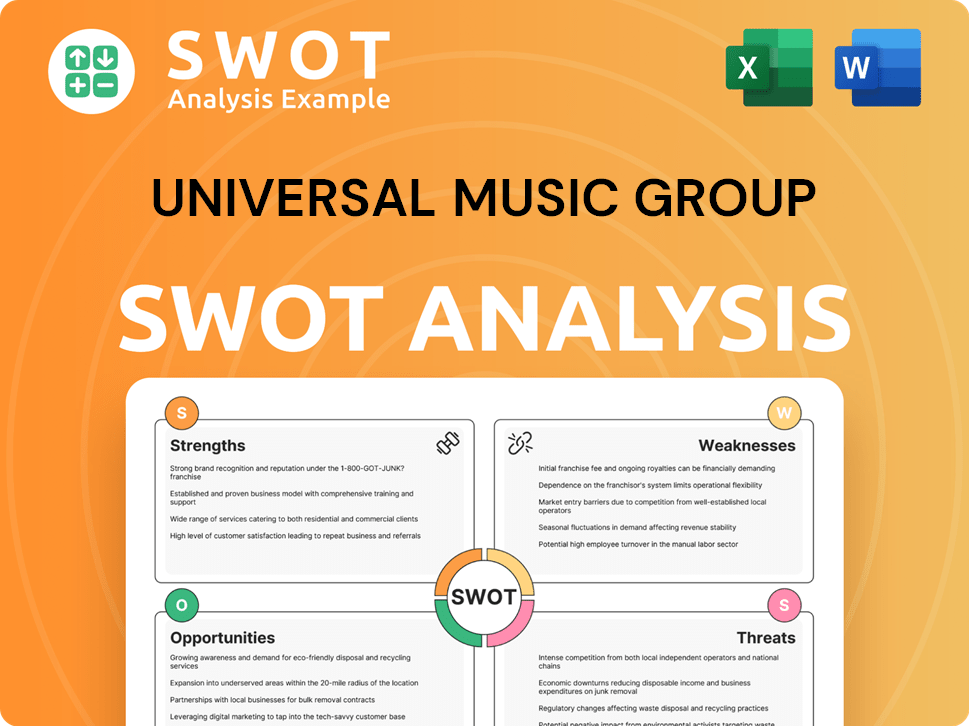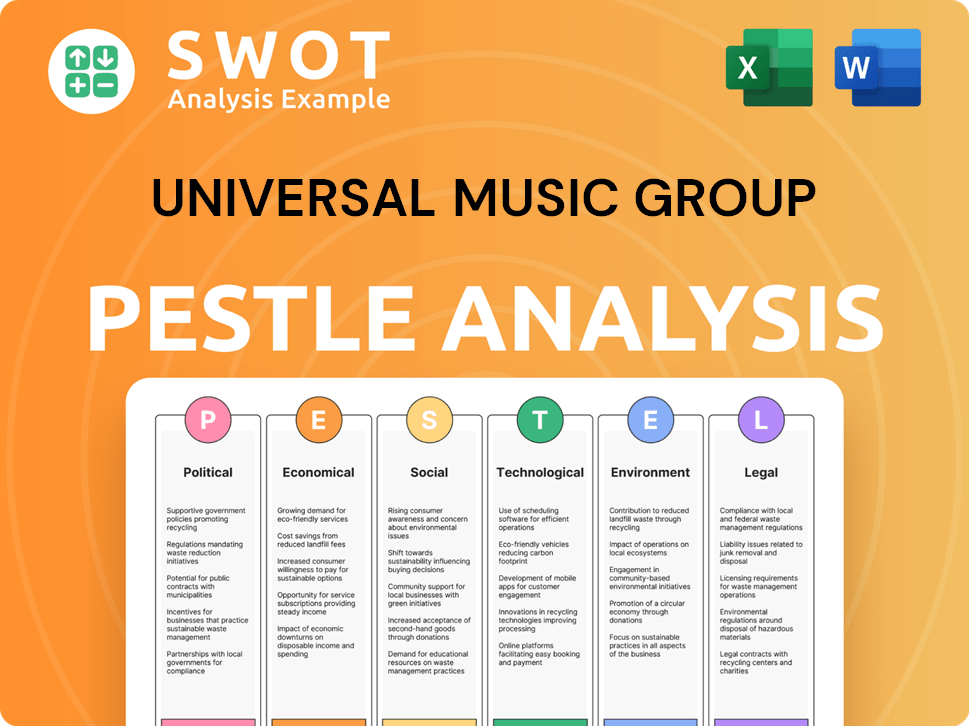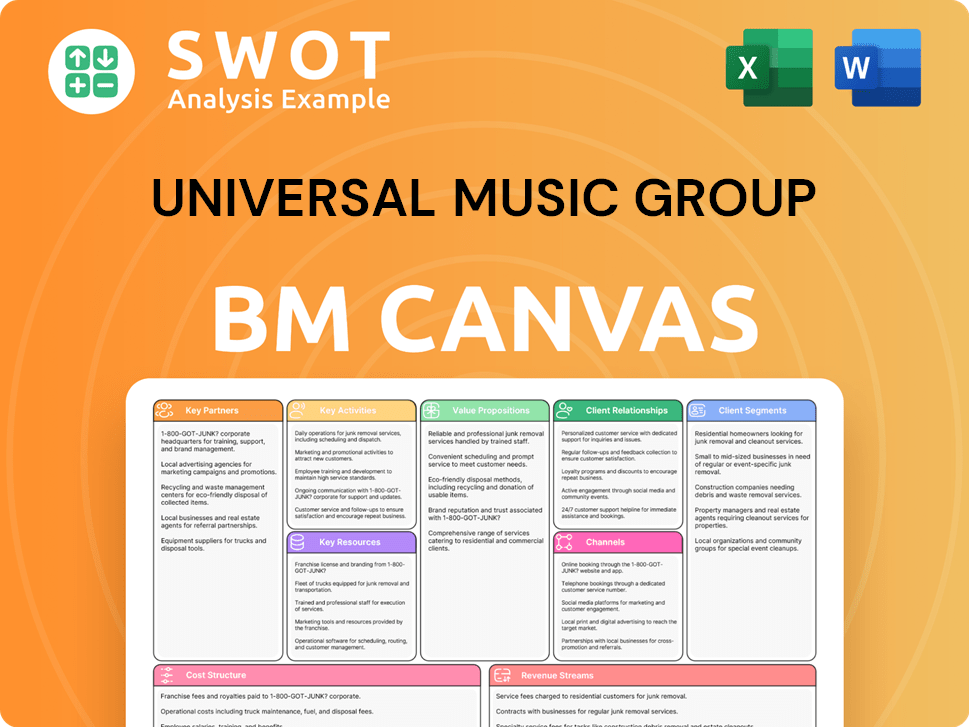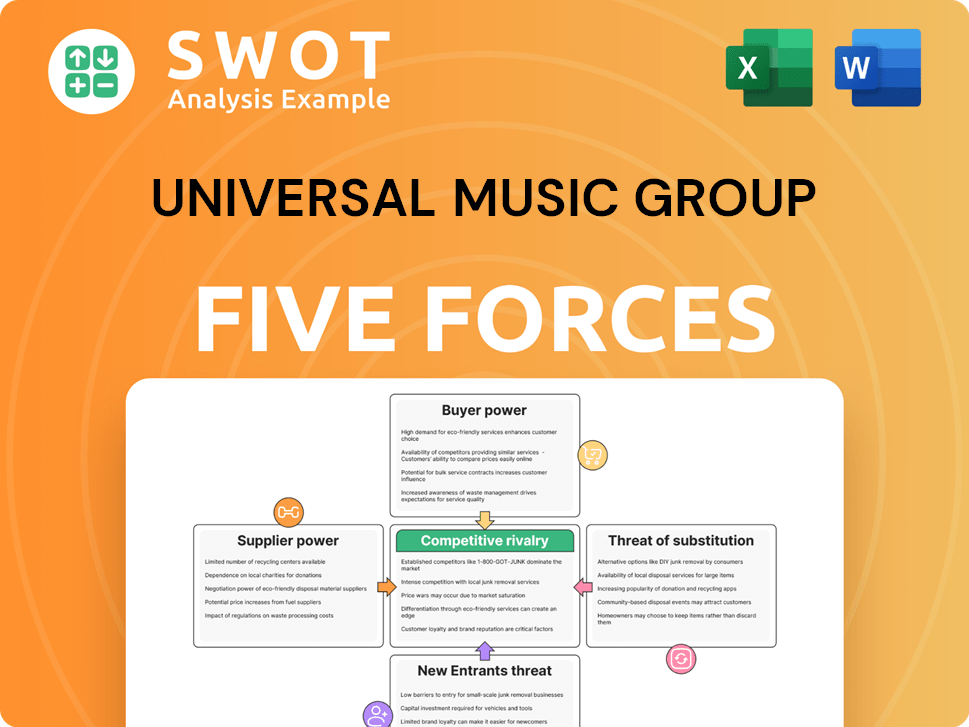Universal Music Group Bundle
Can Universal Music Group Maintain Its Reign in the Evolving Music Industry?
Universal Music Group (UMG), a titan in the global music landscape, recently made waves with its planned acquisition of Because Music, a move that underscores its commitment to strategic expansion. This acquisition, slated for completion in early 2025, is just one facet of UMG's multifaceted growth strategy, which aims to solidify its leadership position. Understanding UMG's approach is crucial for anyone interested in the Universal Music Group SWOT Analysis and the future of the music industry.

From its humble beginnings, Universal Music Group has become a global powerhouse, holding a significant market share. This deep dive will explore UMG's growth strategy, examining its investments in music technology, digital music distribution strategies, and international expansion plans. We'll also analyze the impact of streaming on music and the challenges UMG faces, offering insights into the music industry's future and UMG's prospects.
How Is Universal Music Group Expanding Its Reach?
The expansion initiatives of Universal Music Group (UMG) are a blend of geographical market penetration and strategic diversification of revenue streams. This dual approach is designed to capitalize on the evolving music industry and maintain a competitive edge. The company's growth strategy is heavily influenced by the rapid changes in how music is consumed and distributed globally.
A key focus for UMG is increasing its presence in high-growth emerging markets. These include regions like Asia, Latin America, and Africa, where digital music consumption is experiencing significant growth. UMG is actively investing in local artist development and label partnerships in these areas to cultivate indigenous talent and cater to diverse musical tastes.
Beyond geographical expansion, UMG is aggressively pursuing new product categories and business models. This includes expanding its presence in the burgeoning podcasting and audiobook markets, recognizing the increasing demand for audio content beyond traditional music. UMG is also exploring opportunities in the metaverse and Web3 space, experimenting with NFTs, virtual concerts, and immersive fan experiences to create new avenues for artist-fan engagement and revenue generation. To understand the company's origins, you can read a Brief History of Universal Music Group.
UMG is expanding its footprint in high-growth markets, such as Asia, Latin America, and Africa. This involves investing in local artist development and label partnerships. In 2024, UMG announced new ventures in Southeast Asia, including an A&R hub in Singapore.
UMG is expanding into podcasting and audiobooks to leverage the growing demand for audio content. The company is actively exploring opportunities in the metaverse and Web3, including NFTs and virtual concerts. Mergers and acquisitions remain a key part of UMG's strategy, as seen with the Because Music acquisition.
UMG's expansion strategy focuses on geographical growth and diversifying revenue streams. This includes investing in emerging markets and exploring new digital content formats. The company aims to maintain a competitive edge in the rapidly evolving music industry.
- Emerging Markets: Focus on Asia, Latin America, and Africa.
- New Content Formats: Podcasting, audiobooks, metaverse, and Web3.
- Mergers and Acquisitions: Strategic acquisitions to expand catalog and market reach.
- Artist Development: Investing in local talent and partnerships.
Universal Music Group SWOT Analysis
- Complete SWOT Breakdown
- Fully Customizable
- Editable in Excel & Word
- Professional Formatting
- Investor-Ready Format

How Does Universal Music Group Invest in Innovation?
Universal Music Group's (UMG) innovation and technology strategy is crucial for its sustained growth, focusing on leveraging advancements to enhance artist development, fan engagement, and operational efficiency. The company invests significantly in research and development (R&D), both internally and through collaborations, to explore new frontiers in music creation, distribution, and consumption. This approach is vital as the music industry evolves, particularly in the streaming era.
A key area of focus is the application of artificial intelligence (AI) across its operations. UMG uses AI for data analytics to identify emerging artists, predict music trends, and personalize content recommendations for listeners. This strategic use of technology helps UMG stay ahead in the competitive music market analysis. The company's ability to adapt to technological changes is a key factor in its UMG growth strategy.
Digital transformation is another critical pillar, with UMG continually optimizing its digital infrastructure to streamline content delivery and improve user experience. This includes developing advanced streaming platforms, enhancing its e-commerce capabilities for merchandise, and investing in robust data management systems. These efforts are essential for maintaining and expanding UMG's market share analysis.
UMG leverages AI for artist discovery and trend prediction. In 2024, UMG partnered with an AI-powered music analytics platform. This partnership enhances the A&R scouting process, aiming to identify talent more efficiently.
UMG continually optimizes its digital infrastructure. This includes advanced streaming platforms and enhanced e-commerce. Robust data management systems are also a priority.
UMG explores blockchain for rights management and royalty distribution. This aims to increase transparency and efficiency. The goal is to create a more equitable ecosystem for artists.
UMG collaborates with tech innovators. This includes partnerships with companies specializing in immersive audio technologies. These collaborations enhance listening experiences.
UMG uses technology to reduce its environmental footprint. This extends across its supply chain and operations. Sustainability is a growing focus within the music industry.
Technological advancements create new revenue streams and optimize existing ones. They foster deeper connections between artists and their global fan bases. This contributes directly to growth objectives.
UMG's investments in technology are designed to drive growth and adapt to the evolving music industry. These investments are critical for navigating the challenges facing Universal Music Group and capitalizing on opportunities in the music market.
- AI-Driven Artist Discovery: UMG utilizes AI to analyze vast datasets for identifying emerging artists. This includes analyzing streaming data, social media trends, and audience preferences to predict potential hits.
- Enhanced Streaming Platforms: UMG focuses on improving streaming platforms to enhance user experience and increase engagement. This involves personalized playlists, improved audio quality, and interactive features.
- Blockchain for Rights Management: UMG explores blockchain technology to streamline royalty payments and improve transparency. This aims to ensure artists are fairly compensated and reduce administrative overhead.
- Immersive Audio Technologies: Partnerships with companies specializing in immersive audio are key. This is to deliver richer listening experiences, enhancing fan engagement and creating new revenue streams.
- E-commerce and Merchandise: UMG invests in robust e-commerce platforms to expand merchandise sales. This includes personalized products and exclusive content to deepen artist-fan connections.
Universal Music Group PESTLE Analysis
- Covers All 6 PESTLE Categories
- No Research Needed – Save Hours of Work
- Built by Experts, Trusted by Consultants
- Instant Download, Ready to Use
- 100% Editable, Fully Customizable

What Is Universal Music Group’s Growth Forecast?
The financial outlook for Universal Music Group (UMG) remains strong, supported by consistent revenue from streaming and strategic investments. UMG's financial health is a key indicator of its success in the evolving music industry. The company's ability to adapt to market changes and leverage new technologies is crucial for its long-term growth.
In 2024, UMG reported a revenue increase of approximately 8.7% to €11.1 billion. This growth was accompanied by an 11.5% increase in adjusted EBITDA, reaching €2.3 billion. This demonstrates UMG's ability to not only grow its revenue but also improve its profitability. The music market analysis indicates that streaming services are a major driver of UMG's financial success.
Looking ahead to 2025, analysts anticipate continued revenue growth for UMG, with projections ranging between 7% and 10%. This growth is expected to be fueled by the ongoing expansion of global streaming adoption and the impact of recent acquisitions. UMG's strategic investments in artist and repertoire (A&R) and technology are also expected to contribute to this growth. The Mission, Vision & Core Values of Universal Music Group provide a framework for understanding UMG's long-term goals and strategic direction.
UMG's revenue increased by approximately 8.7% to €11.1 billion in 2024. This growth highlights the company's strong performance in the music market.
Adjusted EBITDA grew by 11.5% to €2.3 billion in 2024. This indicates improved profitability and efficient operations.
Streaming continues to be a primary driver of UMG's revenue growth. The sustained adoption of streaming services globally supports the company's financial outlook.
Analysts predict revenue growth between 7% and 10% for 2025. This forecast reflects confidence in UMG's strategic initiatives and market position.
UMG's investments are focused on A&R, technology, and acquisitions. These investments are crucial for the company's long-term success. The UMG growth strategy includes:
- Investing in new talent and existing artists.
- Developing digital infrastructure and data analytics.
- Prudent capital allocation and M&A activities.
- Adapting to the changing music industry.
Universal Music Group Business Model Canvas
- Complete 9-Block Business Model Canvas
- Effortlessly Communicate Your Business Strategy
- Investor-Ready BMC Format
- 100% Editable and Customizable
- Clear and Structured Layout

What Risks Could Slow Universal Music Group’s Growth?
The future trajectory of Universal Music Group (UMG) is subject to several risks and obstacles. These challenges range from competitive pressures and regulatory hurdles to the rapid evolution of technology and shifts in consumer behavior. Understanding these potential pitfalls is crucial for assessing UMG's long-term growth prospects.
The music industry is dynamic, and UMG must navigate these complexities to sustain its market position. The company's ability to adapt and mitigate these risks will significantly influence its success in the coming years. This involves strategic planning, technological innovation, and proactive management of external factors.
The music industry's competitive landscape presents a significant challenge for Universal Music Group. The presence of major labels like Sony Music Entertainment and Warner Music Group, along with independent labels and direct-to-artist platforms, intensifies competition. This competition affects artist acquisition and retention, as well as the terms UMG can secure with streaming services. In 2024, the global music market is estimated to be worth over $26.2 billion, highlighting the scale of the competition.
Regulatory changes pose another significant risk. Copyright laws, digital rights management, and antitrust regulations in different markets can impact UMG. Ongoing debates about royalty splits with streaming platforms could significantly affect UMG's revenue streams. The music industry is constantly evolving, and UMG must adapt to new regulations.
Technological advancements pose a constant threat. New formats, platforms, and consumption habits can rapidly change the industry. Failing to adapt to emerging technologies like AI in music creation or metaverse applications could lead to missed opportunities. UMG needs to stay ahead of the curve to maintain its competitive edge.
Supply chain vulnerabilities, particularly in physical music distribution and merchandise, could present challenges. Although UMG relies increasingly on digital distribution, disruptions in physical distribution can still affect revenue. The company must manage these risks effectively to ensure consistent operations.
Internal resource constraints, such as attracting and retaining top talent, could also hinder growth. Competition for skilled professionals is intense. UMG's ability to secure and retain talent is critical for its long-term success in a competitive industry. The company must invest in its workforce to overcome this challenge.
UMG addresses these risks through diversification of its artist roster and revenue streams. It also employs robust legal and compliance frameworks to navigate regulatory complexities. Continuous investment in technology and data analytics is another key strategy. Scenario planning helps UMG anticipate and prepare for potential disruptions. For example, UMG has actively engaged in industry discussions and partnerships to shape the future of AI in music, aiming to mitigate potential negative impacts while harnessing its benefits.
The dominance of streaming services has reshaped the music industry, presenting both opportunities and challenges for UMG. While streaming has boosted overall revenue, it also influences royalty splits and artist compensation models. Understanding the Revenue Streams & Business Model of Universal Music Group is crucial to navigate these shifts.
A comprehensive music market analysis reveals that streaming accounted for over 67% of global recorded music revenue in 2024. This shift highlights the importance of UMG's digital music distribution strategies. The company’s ability to maximize revenue from streaming platforms directly impacts its financial performance.
The UMG business model relies on multiple revenue streams, including recorded music, music publishing, and merchandising. Diversification is crucial for mitigating risks. UMG's strategy to diversify its artist roster and explore new revenue streams helps it adapt to the dynamic music industry.
While digital is dominant, physical music sales still contribute to UMG's revenue. The future of physical music sales for UMG depends on effective supply chain management and targeted marketing. Although digital distribution is increasing, the company must continue to support physical formats to cater to a dedicated consumer base.
The role of AI in Universal Music Group's future is significant. UMG's investments in music technology and its engagement in industry discussions about AI demonstrate its commitment to innovation. The company aims to harness AI's benefits while mitigating potential negative impacts on the music industry.
Universal Music Group Porter's Five Forces Analysis
- Covers All 5 Competitive Forces in Detail
- Structured for Consultants, Students, and Founders
- 100% Editable in Microsoft Word & Excel
- Instant Digital Download – Use Immediately
- Compatible with Mac & PC – Fully Unlocked

Related Blogs
- What are Mission Vision & Core Values of Universal Music Group Company?
- What is Competitive Landscape of Universal Music Group Company?
- How Does Universal Music Group Company Work?
- What is Sales and Marketing Strategy of Universal Music Group Company?
- What is Brief History of Universal Music Group Company?
- Who Owns Universal Music Group Company?
- What is Customer Demographics and Target Market of Universal Music Group Company?
Disclaimer
All information, articles, and product details provided on this website are for general informational and educational purposes only. We do not claim any ownership over, nor do we intend to infringe upon, any trademarks, copyrights, logos, brand names, or other intellectual property mentioned or depicted on this site. Such intellectual property remains the property of its respective owners, and any references here are made solely for identification or informational purposes, without implying any affiliation, endorsement, or partnership.
We make no representations or warranties, express or implied, regarding the accuracy, completeness, or suitability of any content or products presented. Nothing on this website should be construed as legal, tax, investment, financial, medical, or other professional advice. In addition, no part of this site—including articles or product references—constitutes a solicitation, recommendation, endorsement, advertisement, or offer to buy or sell any securities, franchises, or other financial instruments, particularly in jurisdictions where such activity would be unlawful.
All content is of a general nature and may not address the specific circumstances of any individual or entity. It is not a substitute for professional advice or services. Any actions you take based on the information provided here are strictly at your own risk. You accept full responsibility for any decisions or outcomes arising from your use of this website and agree to release us from any liability in connection with your use of, or reliance upon, the content or products found herein.